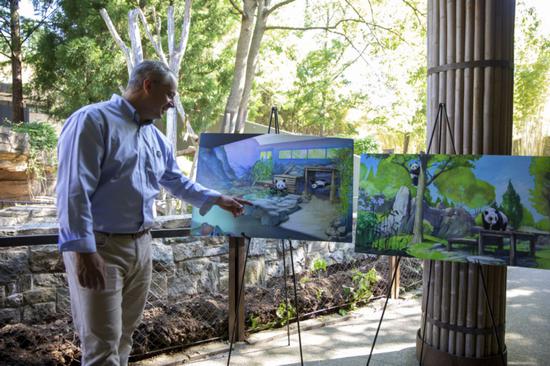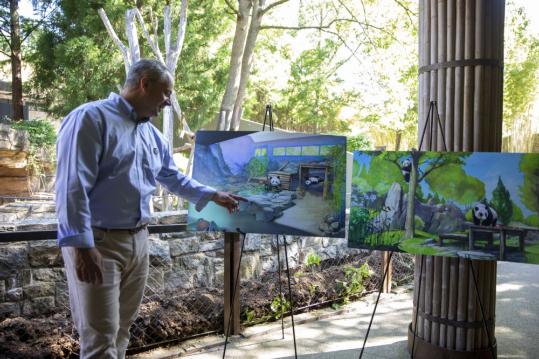DC thrilled with planned return of pandas to zoo

Mike Beglinger, deputy director of planning and program management at Smithsonian's Office of Planning , Design and Construction, introduces an artist's rendering of the new pair of giant pandas near the David M. Rubenstein Family Giant Panda Habitat at the National Zoo on Wednesday. Zhao Huanxin/China Daily
In 1972, when then-U.S. first lady Patricia Nixon welcomed the first pair of giant pandas to Washington's National Zoo, Jill Biden was a 20-year-old college student.
In a video posted on Wednesday, Mrs. Biden, the current U.S. first lady, got her chance to welcome the arrival of a pair of pandas. As she enthusiastically clutched a toy panda that someone threw to her, the first lady exclaimed: "We can't wait to celebrate this historic moment here in our nation's capital. Join us. It's official! The pandas are coming back to DC!"
Joining the first lady in the video were National Zoo Director Brandie Smith and Smithsonian Secretary Lonnie G. Bunch III. They announced the arrival of the new giant pandas for later this year and joked about preparing for two special guests at the White House.
"We are excited for children near and far to once again enjoy the giant pandas' adorable and joyful adventures at our @NationalZoo," Biden said in a social media post, six months after the U.S. capital bid an emotional farewell to the last three giant pandas, including a pair that arrived 23 years ago, which left for China in November.
"We're thrilled to announce the next chapter of our breeding and conservation partnership begins by welcoming two new bears, including a descendant of our beloved panda family, to Washington, DC," Smith said at the Zoo.
Early in the morning, workers put up signs on the flagpole at the entrance to the zoo, stating: "The Pandas Are Coming". There are also fresh displays of panda-themed merchandise such as shirts and shopping bags in the gift shops inside the zoo.
The newcomers are two 2-year-old pandas, Bao Li and Qing Bao, who will arrive at the Smithsonian National Zoo and Conservation Biology Institute by the end of the year, in partnership with the China Wildlife Conservation Association.
The mother of the male bear, Bao Li, whose name means "treasure" and "energetic" in Chinese, was born at the zoo in 2013, and his grandparents lived there from 2000 to 2023.
The female, Qing Bao, whose name was voted by Chinese netizens, literally means "a treasure in green mountains".
"This historic moment is proof positive our collaboration with Chinese colleagues has made an irrefutable impact," Smith said.
A cooperative research and breeding agreement signed by Smith and Wu Minglu, secretary-general of the China Wildlife Conservation Association, is effective through April 2034, according to a press release from the zoo.
The zoo will pay a $1 million annual fee to the association to support research and conservation efforts in China.
In a statement on Wednesday, the Chinese association said it believed the new round of China-U.S. cooperation on giant panda conservation will yield more results in the prevention and control of major giant panda diseases, bolster scientific and technological exchanges, and contribute to global biodiversity conservation while enhancing the friendship between the two peoples.
Wednesday's announcement builds upon a half-century of fruitful collaboration between the United States and China to save the giant panda from extinction.
"I'm so proud to say that this long-standing program and this collaboration with our Chinese colleagues is one of the reasons why the giant pandas are no longer listed as endangered but rather only vulnerable on the global list of species at risk of extinction," Smith said.
"Giant pandas truly represent how great partnerships and great outcomes can be achieved through when we work together and then with public support," she added.
Smith also said that in the new phase of partnership, the program will be different in terms of what the zoo has studied with earlier pandas there, when one of the focuses was on reproduction.
"But we've solved a lot of those problems, and so with these new pandas, our focus is actually a little bit more on giant pandas in the wild — understanding bamboo forests, wildlife diseases, different things like that," Smith told China Daily.
Smithsonian scientists and Chinese partners plan to expand research across disciplines to ensure panda health and welfare in human care as well as the continuation of critical work for wild populations, the zoo said in a statement.
To gain an appreciation of how Americans have been fascinated by the furry black-and-white icons, Theodore H Reed, Smith's predecessor, wrote in a National Geographic magazine story in December 1972: "Whenever I look at our young giant pandas, I think I can explain the animals' universal appeal. The trouble is, everyone else seems to be looking too, instead of listening."
Over the past five decades, giant pandas have held a special place in the childhood memories of numerous Americans, noted Xie Feng, Chinese ambassador to the U.S., who said he received messages asking for new giant pandas to be sent to Washington when the last three went back to China.
"Two little panda fans from California wrote me several cute letters, proposing giving China grizzly bears to get pandas," Xie said at the zoo. "The love for pandas stays unabated."
The ambassador announced that with the latest round of giant panda conservation cooperation in a year that marks the 45th anniversary of the establishment of China-U.S. diplomatic ties, Americans will get to see pandas more often, as apart from Bao Li and Qing Bao, another pair, Yun Chuan and Xin Bao, will head to the San Diego Zoo.
"'Panda-huggers' should not be stigmatized. If there should be any protectionism, then let's protect biodiversity, protect the only home for the entire humanity, protect a stable, sound and sustainable China-U.S. relationship, and protect a better future for the younger generations," Xie said.
"I encourage everyone to care for China-U.S. relations just as you care for pandas, and jointly usher in a peaceful and prosperous future," he added.
Melissa Songer, a conservation ecologist with the zoo, said she was in China in recent months and got to see new giant pandas.
"They look fantastic. They are beautiful pandas, very healthy, and especially Bao Li was out playing and having a great time," she said.

